The lack of skilled workers is one of the most strategic challenges facing agriculture, especially in those products for which there is no automated harvesting and that are highly dependent on skilled labor, including berries and other small fruits.
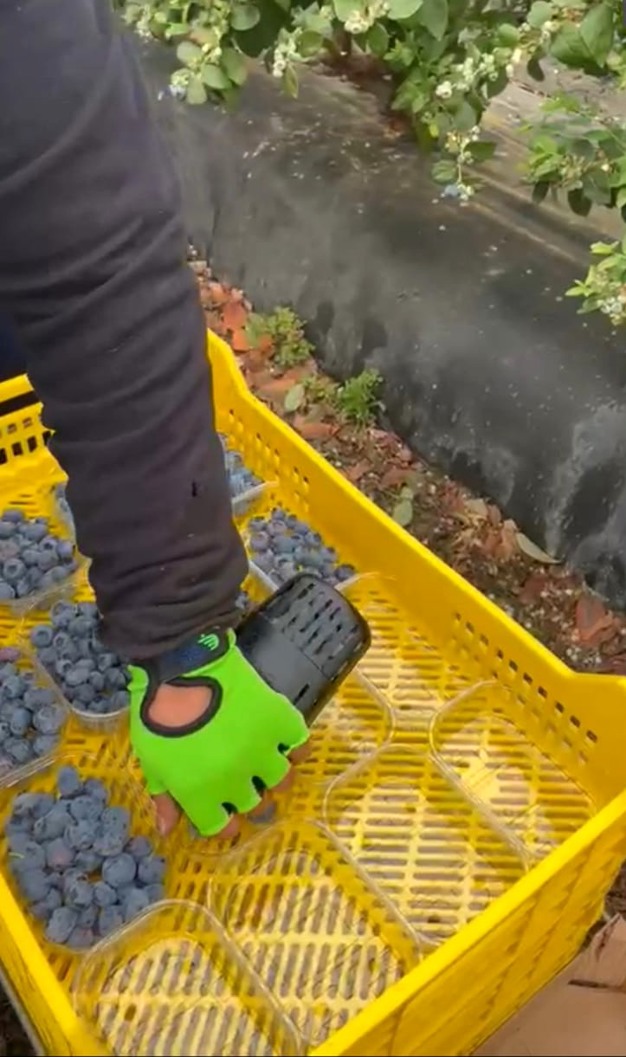 In the case of blueberries alone, according to Faostat data, in 2021, the sector required thousands of workers to harvest the 1.1 million tons of blueberries that were produced on 163,700 hectares worldwide. Therefore, having tools that allow workers to be more efficient, helping them to minimize body movements and avoid unnecessary physical strain, is very important to make this seasonal work activity easier and more attractive. The Pickpick gloves represent an "evolution in berry picking", as Jose Antonio Marquez points out.
In the case of blueberries alone, according to Faostat data, in 2021, the sector required thousands of workers to harvest the 1.1 million tons of blueberries that were produced on 163,700 hectares worldwide. Therefore, having tools that allow workers to be more efficient, helping them to minimize body movements and avoid unnecessary physical strain, is very important to make this seasonal work activity easier and more attractive. The Pickpick gloves represent an "evolution in berry picking", as Jose Antonio Marquez points out.
"They are already successfully used to harvest blueberries, raspberries, blackberries, cherry tomatoes, and even coffee on five continents. In addition, they are currently being tested in strawberry plantations. They have been used by workers in Argentina, Canada, New Zealand, Australia, India, Central Europe, Eastern Europe, Scandinavia, Israel, South Africa, as well as Morocco, and their reactions have been very positive."

Harvesting cherry tomatoes with the Pickpick gloves
"Each employee harvested 12-15% more raspberries and blackberries"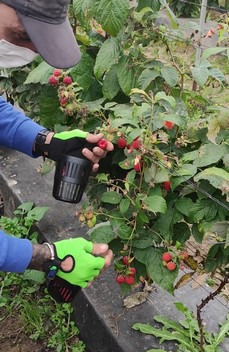 The Romanian company Zabrani Green Energy, which cultivates 7 hectares of blackberries and raspberries in Timisoara, in the west of the country, used the Pickpick gloves for the first time last year.
The Romanian company Zabrani Green Energy, which cultivates 7 hectares of blackberries and raspberries in Timisoara, in the west of the country, used the Pickpick gloves for the first time last year.
"Zabrani, also suffers from a lack of workers. When I found out about these gloves I thought it was a very good idea, and I made an order to try them out. In the first two weeks, we had a lot of difficulty teaching employees how to use them, but once they got used to them, they all wanted to continue using them," stated Roberto Yammine, one of Zabrani's partners. "Our production has grown by 12 to 15 percent since we started using them."
"We harvest more fruit at a lower cost. It's true that we pay per kilo of fruit harvested, but we are interested in harvesting as much as possible. Raspberries and blackberries are very perishable and very sensitive fruits, and the ready-to-harvest product that isn't harvested one day must be thrown away the next day," Roberto stated. "Additionally, the gloves allow collectors to work with both hands, and the basket helps them to keep track of how much they have harvested, which also helps us a lot when it comes to correcting the weight of each tray."
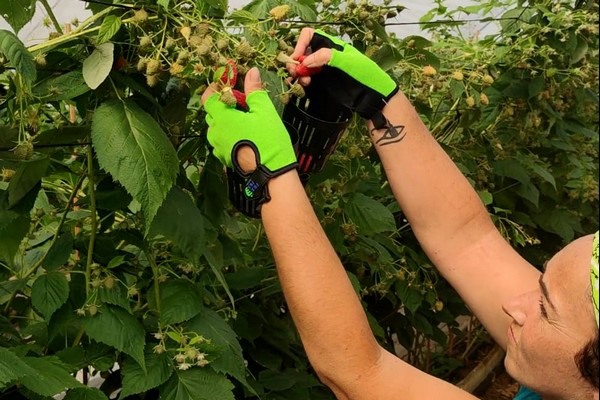
Harvesting raspberries with Pickpick.
This spring, Zabrani Energía Verde will launch a project to cultivate 5 new hectares of blueberries to complement its range of organic berries, which it exports mainly to Germany and Austria. "Our intention is to acquire more gloves for our collectors," says Roberto. "There are cherry tomato, blackberry, and blueberry producing companies in the region that have seen us work with the Pickpick gloves, and they have already visited us to see how they work and to try them out. Lipova, a blueberry company that has more than 70 hectares, is also very interested in them."
"The staff is requesting them"
In Huelva, Angel Ramos Perez, from Cachorro Berry, a partner of Cuna de Platero, will also use them again in this campaign. "Last year, before implementing them on my farm, I personally tested the gloves and saw that they were very interesting because they are an improvement both for the fruit and for the person who is harvesting it. 100% of my staff used them last season, and this year, I have already introduced them as a necessary tool from the start. In addition, the staff is requesting them."

Harvesting blueberries with Pickpick.
Cachorro Berry cultivates blueberries on 40 hectares, producing more than 500,000 kilos between January and June and employing around 150 people. "The whole sector is increasingly understaffed. However, the harvesters of Cachorro are very satisfied with the gloves because, as they themselves stated, they make much fewer movements and don't have to hold the fruit in their hands."
"That's very important for the blueberries, as they're not heated by the collectors' hands, nor do they lose their bloom," Angel stated.
How do they work?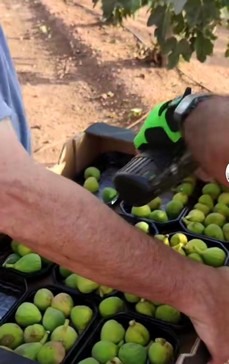 The Pickpick gloves have a basket coupled to them where the fruits that the harvester detaches from the plant with his fingers fall, so that the pressure and temperature of the hands don't affect the quality of the product and, with a volume of 200 grams per basket, reducing by up to 30% the number of movements that workers have to perform per day. (Photo: Harvesting figs with Pickpick)
The Pickpick gloves have a basket coupled to them where the fruits that the harvester detaches from the plant with his fingers fall, so that the pressure and temperature of the hands don't affect the quality of the product and, with a volume of 200 grams per basket, reducing by up to 30% the number of movements that workers have to perform per day. (Photo: Harvesting figs with Pickpick)
For more information:
Pickpick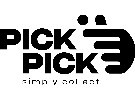
Plaza del Olivillo, 32
21810 Palos de la Frontera, Huelva (España)
Tel.: +34 658 573 359
[email protected]
www.pickpick.es
